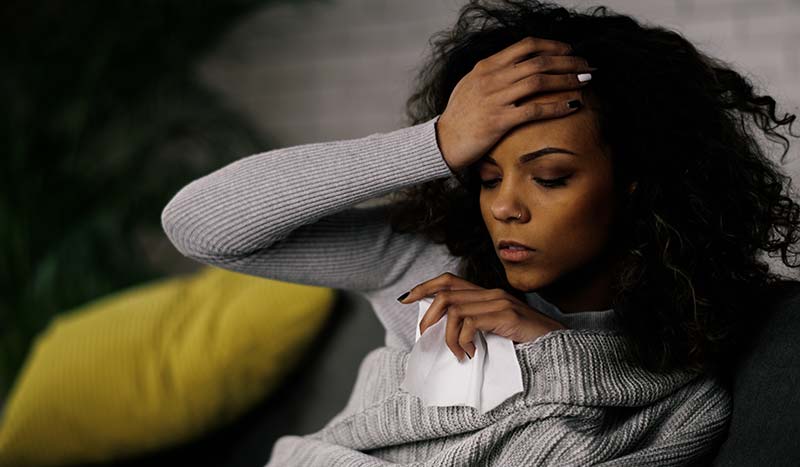This article was published on: 04/3/20 11:58 AM

“COVID-19”, “The virus”, “the Coronavirus”, is all we hear about these days. It’s on the radio, the TV, social media, business websites, just notice the “breaking news” alerts on your phone. It’s everywhere and hard to get away from.
Just two weeks or so ago, after more cases were being reported in the US, our grocery stores were suddenly mobbed with shoppers with fears that we would be quarantined without food, water and paper products. The lines were extreme and very quickly, the shelves grew bare as people stockpiled their grocery carts to the brim. No meats, no disinfectants or paper products left.
Each day we hear about the increasing numbers of people infected, those hospitalized, those on ventilators and the number of deaths. Watching and listening to the news can instill fear in everyone and not just in those who already suffer from an anxiety disorder or contamination OCD.
Today, schools, universities, gyms, churches and all “nonessential business” doors are closed. People are not flocking to the grocery stores so much. The aisles are shy of shoppers, even in Target and big grocery stores like Wegmans. Most grocery stores now have attendants spraying and wiping carts down, their employees wearing gloves & masks, as are most patrons. There are yellow and black strips of tape on the floors to distance shoppers from employees and from one another.
It’s not surprising that people are anxious and afraid. Although, mankind has been through many, many adversities, such as the Great Depression, deadly diseases, wars, famine, etc., it can be difficult to maintain a healthy adaptive frame of mind. One of the most important factors is to understand the facts rather than the hype and hysteria. Seeing and hearing bits of news articles, press conferences, news reports and listening to lay interpretations from others can lead to inaccurate appraisals of the situation. It’s best to become informed by the world experts such as the Center for Disease Control and Prevention (CDC) and the World Health Organization (WHO).
According to the CDC and WHO, most people who contract COVID-19 will generally experience more mild symptoms, especially children and younger adults. Symptoms include fever, cough and possibly shortness of breath. Older adults and people who have severe underlying medical conditions like lung disease, heart disease or diabetes are the most at risk for developing more serious complications. Is there reason for concern? Yes, of course. Reason for fear and panic? Not as long as we follow the precautions outlined by the CDC and WHO. You can find the most accurate guidelines for preventing illness and transmission at www.cdc.gov and www.who.int
Again, understanding the real facts is key. Aside from symptomology and prognosis, it’s important to know how the virus is spread. COVID-19 is spread between people via respiratory droplets that can land in another person’s mouth or nose should the infected person sneeze or cough and may be transmitted by touching a contaminated surface or object then touching your mouth, nose or possibly your eyes (CDC, WHO, March 29, 2020). The CDC does not believe touching surfaces or objects is the main way that the virus spreads. Experts at a March 27th WHO press conference stated that “the disease is not airborne”. The risk of catching the virus from someone with no symptoms is very low. The problem arises when someone who experiences very mild symptoms does not take proper precautions to prevent transmission to others who may be more vulnerable.
All of this information can be helpful but also overwhelming. If you currently suffer from an anxiety disorder and/or OCD or related disorder, you may find your symptoms exacerbating during this time. Please know that this is normal and not a sign that you are in full blown relapse. However, it’s very important to continue your treatment with your therapist and any other mental health providers you are working with. Mental health practitioners and their facilities are considered an “essential business”. Most are seeing patients via telehealth (video sessions). This is NOT the time to back down from treatment.
written by Andrea Batton, LCPC, Clinical Director

 The Maryland Anxiety Center was founded by Andrea G. Batton, LCPC with a vision of creating a practice where clinicians and staff work cohesively and collaboratively with patients to provide optimal psychological care. The Maryland Anxiety Center specializes in the treatment of anxiety and related disorders from a cognitive behavioral perspective, the gold-standard and most effective treatment for such conditions.
The Maryland Anxiety Center was founded by Andrea G. Batton, LCPC with a vision of creating a practice where clinicians and staff work cohesively and collaboratively with patients to provide optimal psychological care. The Maryland Anxiety Center specializes in the treatment of anxiety and related disorders from a cognitive behavioral perspective, the gold-standard and most effective treatment for such conditions.